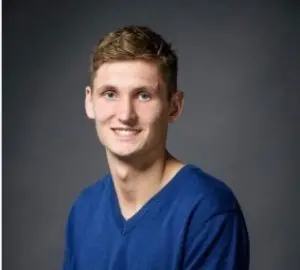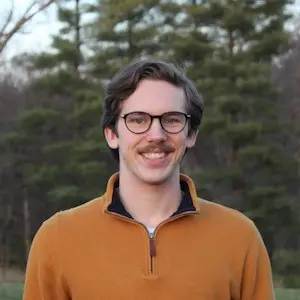Two University of Wisconsin-Madison graduate students are recipients of U.S. Department of Energy Nuclear Energy University Program Fellowships beginning in 2021.
 John Lacy
John Lacy
The prestigious fellowships are designed to bring highly qualified students into the nuclear science and engineering professions and encourage the development and exploration of advanced nuclear science and technology. The fellowship includes $52,000 per year over three years to support graduate study and research as well as $5,000 to support a summer internship at a national laboratory and travel to industry and academic conferences.
John Lacy is currently a master’s student working in the Nuclear and Applied Research Group led by Kumar Sridharan, a professor of nuclear engineering and engineering physics and material science and engineering. Lacy’s main research thrust is studying corrosion in nuclear settings. Currently, spent nuclear fuel is often stored in stainless-steel dry casks which can develop a type of failure called chloride induced stress corrosion cracking (CISCC). For his thesis, Lacy will use mechanical techniques like surface peening technology and electrochemical techniques to prevent or stop CISCC and improve the safety and lifetime of spent nuclear fuel storage.
This fellowship, he says, will allow him to work in a national lab and attend conferences he might not have been able to without the funding. Those travels, he hopes, will aid him in developing experiences and connections in academia and industry. The fellowship will also let him dive deeper into his research and may allow him to pursue his PhD.
 Nathan Curtis
Nathan Curtis
Nathan Curtis recently graduated from the Missouri University of Science and Technology and will join UW-Madison in the fall of 2021 as a PhD student working with Sridharan and Adrien Couet, an assistant professor in engineering physics and materials science and engineering.
Curtis’s research focuses on the need for cladding materials resistant to the effects of irradiation, corrosion, elevated temperatures and mechanical stresses in the nuclear industry. He will systematically study a novel class of materials called high entropy alloys that show enhanced resistance to irradiation.
The fellowship, Curtis says, will give him the financial freedom to fully immerse himself in his studies. It may also allow him to provide research opportunities to undergraduate students, something that was very important to him during his own undergraduate work. He is also grateful for the chance to enrich his education working at a national lab and to present his work at various conferences, which he says will greatly enhance his education and experience within the nuclear industry.